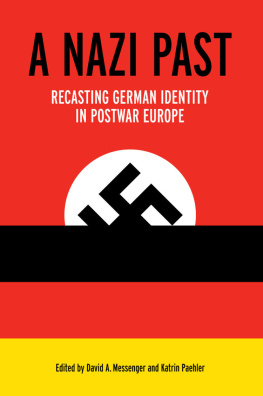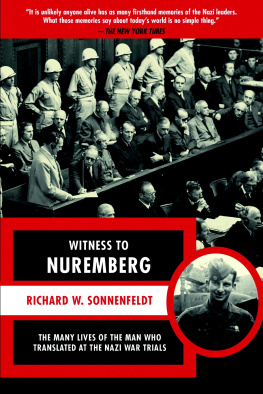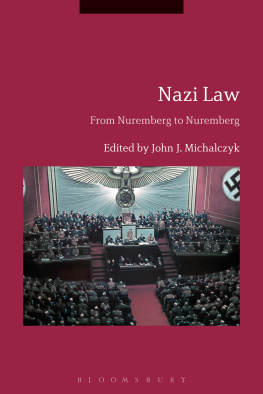A NAZI PAST
A NAZI PAST
Recasting German Identity in Postwar Europe
Edited by
David A. Messenger and Katrin Paehler

Due to variations in the technical specifications of different electronic reading devices, some elements of this ebook may not appear as they do in the print edition. Readers are encouraged to experiment with user settings for optimum results.
Copyright 2015 by The University Press of Kentucky
Scholarly publisher for the Commonwealth, serving Bellarmine University, Berea College, Centre College of Kentucky, Eastern Kentucky University, The Filson Historical Society, Georgetown College, Kentucky Historical Society, Kentucky State University, Morehead State University, Murray State University, Northern Kentucky University, Transylvania University, University of Kentucky, University of Louisville, and Western Kentucky University.
All rights reserved.
Editorial and Sales Offices: The University Press of Kentucky
663 South Limestone Street, Lexington, Kentucky 40508-4008
www.kentuckypress.com
Library of Congress Cataloging-in-Publication Data
A Nazi past : recasting German identity in postwar Europe / edited by David A. Messenger and Katrin Paehler.
pages cm
Includes index.
ISBN 978-0-8131-6056-6 (hbk. : alk. paper) ISBN 978-0-8131-6057-3 (pdf) ISBN 978-0-8131-6058-0 (epub)
1. NazisGermany (West)Biography. 2. DenazificationGermany (West) 3. Ex-NazisGermany (West)Psychology. 4. Denial (Psychology)Case studies. 5. War criminalsGermany (West)Biography. 6. National socialismMoral and ethical aspects. 7. Group identityGermany (West) I. Messenger, David A., editor. II. Paehler, Katrin, editor. III. Title: Recasting German identity in postwar Europe.
DD243.A44 2015
943.0860922dc23 2014049366
This book is printed on acid-free paper meeting the requirements of the American National Standard for Permanence in Paper for Printed Library Materials.

Manufactured in the United States of America.

| Member of the Association of American University Presses |
Contents
David A. Messenger and Katrin Paehler
Daniel E. Rogers
Katrin Paehler
Hilary Earl
David A. Messenger
Susanna Schrafstetter
Thomas W. Maulucci
Kerstin von Lingen
Florian Altenhner
Gerald Steinacher
Elisabeth Kohlhaas
Norman J. W. Goda
Abbreviations
| ACC | Allied Control Council |
| BND | Bundesnachrichtendienst (Federal Intelligence Service) |
| CDU | Christlich Demokratische Union Deutschlands (Christian Democratic Union of Germany) |
| CIC | Counterintelligence Corps |
| FDP | Freie Demokratische Partei (Free Democratic Party) |
| GDR | German Democratic Republic |
| IMT | International Military Tribunal |
| NSDAP | Nationalsozialistische Deutsche Arbeiterpartei (National Socialist German Workers Party) |
| ODESSA | Organization der ehemaligen SS-Angehrigen (Organization of Former SS Members) |
| OSS | Office of Strategic Services |
| RSHA | Reichssicherheitshauptamt (Reich Security Main Office) |
| SA | Sturmabteilung (NSDAP Stormtrooper section) |
| SD | Sicherheitsdienst (Security and Intelligence Service of the SS) |
| SHAEF | Supreme Headquarters of the Allied Expeditionary Forces |
| SPD | Sozialdemokratische Partei Deutschlands (Social Democratic Party of Germany) |
| SS | Schutzstaffel (NSDAP Protection Squadron) |
Introduction
David A. Messenger and Katrin Paehler
He made it through denazification without many problems. He was categorized as a follower. He stood trial but was acquitted. He received a mild sentence. His sentence was commuted. He went on to make a career in the Federal Republic of Germany or made good elsewhere. At the very basic level, this book grew out of a deceptively simple question: how did members of Nazi Germanys functional elites manage to recast their past experiences in such a way as to move on to successful careers and lives in postwar Europe? What type of active roles did these menand a few womenplay in the process through which they recast themselves, their former activities, and their convictions? What type of networks existed that made this process easier? This volume addresses these and other questions by focusing on the career paths, ideas, and agency of select individuals known to have had Brown Pasts. Some of these names are familiar; others are less known. The eleven case studies assembled here investigate the private recasting processes of Nazi functional elites, such as presumed lesser German war criminals, SS members, party functionaries, administrators of spoliation and genocide, and intelligence agents, as well as the networks they created and used to make these processes possible. Rather than running from their pasts, these individuals embraced selective parts of their biographies during the Third Reich and made them congruent with the conservative character of the Federal Republic and the ideological contest of the emergent Cold War.
It is well known that a good number of former Nazi functionaries ascended to positions of influence in the Federal Republic of Germany. Like clockwork, West Germany encountered scandals. Some of them were of domestic origin, as for example the case of Untersuchungsausschuss Nr. 47 (Investigative Committee No. 47), which, in response to newspaper reports in 1951, dealt with former Nazis in the Foreign Office.1 Others originated outside of the Federal Republic, such as the infamous Waldheim affair, when former United Nations Secretary-General Kurt Waldheims past as a Wehrmacht officer came to light during his run for Austrias presidency in 1985.2 More frequently than not, such scandals emerged from the other Germanythe German Democratic Republicwhich hoped to score points in the Cold Wars German-German propaganda battle. Most notable in this context is the Brown Book, published in East Berlin in 1965 and designed to draw the worlds attention to former Nazis in positions of influence in the Federal Republic. The materials, swiftly rejected by the West German government as Communist propaganda, were an embarrassment for the Federal Republic. The Brown Book was also, at least for the time being, the culmination of a constant flow of information and accusations originating in the GDR. As Ulrich Brochhagen has shown, these East German information releases did not remain domestic or even German-German issues; rather, they often led to diplomatic issues for the Federal Republic.3 West German journalists also did much to draw the West German publics attention to former high-ranking Nazis in position of power and influence. So did the Student Movement, which from the late 1960s onward mobilized a counterpublic that challenged the West German establishment and its fascist tendencies. Recent years have seen scholarly treatments of the same issues. By and large, the studies confirm the reality that many former Nazis moved more or less seamlessly into their postwar careers.4
Scholars have focused on the various reasons for this development. For example, they have studied the policies that either made it possible for former Nazis to embark on postwar careers or at least did not prevent them from doing so. One focus has been on the limits of denazification. As established at the Potsdam Conference, denazification was meant to destroy the National Socialist German Workers Party (NSDAP) and its affiliated organizations. The goal was to negate Nazi institutions and laws, arrest and intern war criminals, remove Nazi officials from public and semipublic life, and eliminate National Socialist influence from the German education system. The Allied Control Council (ACC) took charge of these efforts and was aided by laws developed within each occupied zone. Combining ideas of reeducation and punishment, the architects of denazification saw internees as potential threats to security, order, and stability, and they sought to remove Nazism from German political and cultural life. Similarly, they hoped to render Germanys economy and politics less militaristic.5 The best way to do this, in the minds of Allied planners, was to remove people from positions of influence and power.
Next page












